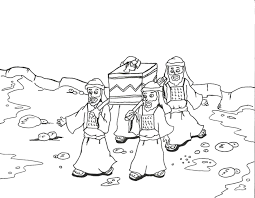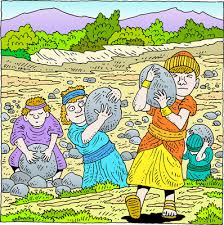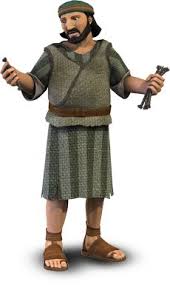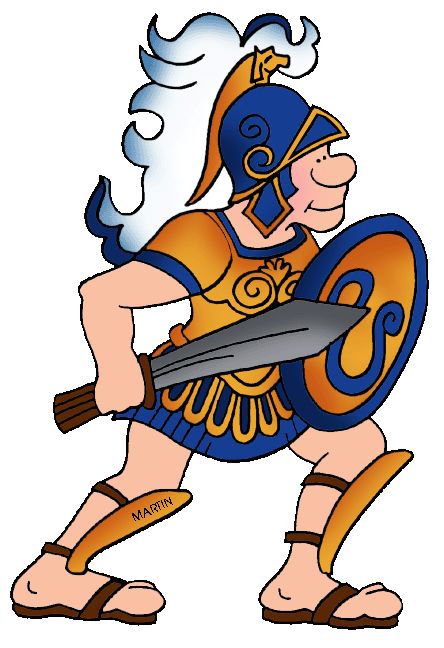Joshua 4:1 – When all the nation had finished passing over the Jordan, the Lord said to Joshua�

In our last post, we noted that the waters of the Jordan ceased to flow when the priests set foot in the river carrying the Ark of the Covenant. This was similar to the parting of the Red Sea, which took place when Israel left Egypt.
One of the similarities was that neither parting was instantaneous. In the case of the Red Sea, God instructed Moses to hold his staff over the water. Once Moses obeyed, God sent a strong east wind which blew all night. When the morning light dawned, Israel could see that the waters had parted.
Exodus 14:21 - And Moses stretched out his hand over the sea; and the LORD caused the sea to go back by a strong east wind all that night, and made the sea dry land, and the waters were divided.
God often manipulates the laws of nature when performing miracles.� In the case of the Red Sea, scholars speculate that the east wind caused the water to freeze and build up a temporary barrier which parted the sea and allowed the people to pass through. Miraculously, the ice barrier held until Israel passed over, and it melted at the exact moment when Pharaoh and his troops were in the midst of the sea. �
In the case of the Jordan, the Lord most likely parted the water by means of an earthquake which caused a landslide. This theory is supported by the fact that the Jordan valley lies along one of the major fault lines of the earth's surface.
In addition, history records two verifiable landslides which dammed up the Jordan River – one in 1267 AD and one in 1927 AD. The incident in 1927 occurred near the town of Adam (as did the one during the time of Joshua) and resulted in an interrupted flow of water for about 21 continuous hours.
This possible explanation of what occurred does not diminish the miracle in any way; in fact it glorifies the Lord - it would take both God's perfect timing and his power over nature to accomplish this miracle.
Joshua 4:2-3 – "Take twelve men from the people, from each tribe a man, and command them saying, 'Take twelve stones from the very place where the priests' feet stood firmly, and bring them over with you and lay them down in the place where you lodge tonight.'"
In our last post, we noted that Joshua had selected twelve men for a dual purpose.
One, they stood right beside the Jordan as the priests entered it; they were eyewitnesses to the miracle of the parting of the river.� This way, each tribe had a representative that could confirm what really occurred there.� Eyewitness accounts have the ability to crush crazy rumors that sometimes surface when people don't have all the facts.� ���

Two, the twelve men were to wait until all the people had crossed over the riverbed, then each of them had to pick up a stone lying near the feet of the priests.� They were to carry these stones to the first encampment of Israel in the Promised Land.��
Joshua 4:4-6a – Then Joshua called the twelve men from the people of Israel, whom he had appointed, a man from each tribe. And Joshua said to them, "Pass on before the ark of the Lord your God into the midst of the Jordan, and take up each of you a stone upon his shoulder, according to the number of the tribes of the people of Israel, that this may be a sign among you."
The first few verse of this chapter show us a pattern that is evident all throughout the book of Joshua.� We find the Lord giving a command to Joshua (verse 1), then Joshua relaying that command to the people (verses 4-5), and then the people obeying the command (verse 8).

This emphasizes that everything Israel did was done in obedience to the commands of God, not the commands of Joshua.� This is important to keep in mind because some of the events that are about to take place may seem harsh according to the view of man (especially in our culture today), so we need to keep in mind that the actions of Israel were simply obedience to the commands of God, who is sovereign over all the affairs of men.
Stones taken from the riverbed itself were remarkable evidence that the river had actually stopped flowing so Israel could cross over. In fact, the purpose of gathering the stones was to make a memorial for future generations.
As you probably already know, raising stones as a memorial was common in the Old Testament:
- Jacob built a pillar as a memorial to God after he had his dream of the ladder or stairway into heaven (Genesis 28:10-22).
- Jacob and his father-in-law built a memorial on Mount Gilead when they parted company (Genesis 31:43-55). ��
- Samuel set up a memorial stone called Ebenezer as a memorial of the victory that God gave to Israel over the Philistines (I Samuel 7:7-14).
This brings up an important question: Why did God instruct Israel to gather these stones and make a memorial? What was its purpose?
Joshua 4:6b-7 – "When your children ask in time to come, 'What do these stones mean to you?', then you shall tell them that the waters of the Jordan were cut off before the ark of the covenant of the Lord.� When it passed over the Jordan, the waters of the Jordan were cut off.� So these stones shall be to the people of Israel a memorial forever."
The purpose of any memorial is two-fold. First, it provokes questions from those who do not understand its purpose. Second, it gives a testimony or a witness to something.

In this particular case, the stones were to be a witness that God had parted the river in order to allow Israel to cross. It was a testimony to the awesome power of God and to his love for Israel. While man is capable of many great achievements, none of them can compare to the stupendous and astonishing things that God did for Israel – and the things he will do for the church as well!
Furthermore, this memorial was a testimony that God could be trusted to keep his promises – he was assisting Israel to possess the land he had promised to give Abraham.� Since God never changes (Malachi 3:6, Hebrews 13:8), every generation of God's people can/could use this testimony as an assurance that he would be faithful to them as well.
As we consider this story, we can't help but notice the number of stones – 12, one for each tribe.� The stones represent a unified people, who will rule the nation according to the laws of God.� In scripture, 12 is a number that represents governmental perfection.� If the tribes are faithful to the laws of God, they can expect to live in peace and have the blessings of God poured out upon them and their nation. ��

When future generations of Israelites inquired about the stones, it was a chance for their parents to tell them about the greatness of God. As one commentator put it, 'the stones must have tongues in order that their testimony may be complete'. We might call the stones a 'teaching moment' - a chance to declare what God has done.
You and I probably don't make memorials in the same way as ancient Israel. Yet, it is still important for us to speak to our children about the faithfulness of God. They need to understand that God is both present and active in our everyday lives.
Joshua 4:8-9 – And the people of Israel did just as Joshua commanded and took up twelve stones out of the midst of the Jordan, according to the number of the tribes of the people of Israel, just as the Lord told Joshua. And they carried them over with them to the place where they lodged and laid them down there. And Joshua set up twelve stones in the midst of the Jordan, in the place where the feet of the priests bearing the ark of the covenant had stood; and they are there to this day.
As we noted in our last post, many scholars see the wilderness wandering as our time on earth, the crossing of the Jordan as entrance into eternity and the Promised Land as heaven. �
There is also a common spiritual interpretation of this passage as well – the wilderness wandering is our time living in sin, the crossing of the Jordan represents our salvation and baptism, and the Promised Land is our time living as Christians on earth.
Spiritually speaking, we were dead in trespasses and sin, until Christ made atonement for us. In the course of our salvation we have been buried with Christ, quickened with him, raised with him and seated with him in heavenly places:
Ephesians 2:5-6 - Even when we were dead in sins, has made us alive together with Christ, (by grace you are saved;) and has raised us up together, and made us sit together in heavenly places in Christ Jesus:
Here in the age of grace, the church is a 'memorial' (witness) founded upon the rock Christ Jesus (I Peter 2:1-6) and built upon the work of the 12 apostles.� Our lives should encourage sinners to ask us why we are different, which provides us an opportunity to witness about the goodness of God.� We are an eternal memorial to God's grace - Satan may hate us, but hell cannot prevail against us!

God now has a kingdom that includes people from every tongue, tribe and nation. Together, we make up the family of God. It is our responsibility to unify/work together to be an example of God's love to the lost. Each of our lives is a fleshly memorial to the grace of God; we are 'letters' or examples of Christ known and read of all men (II Corinthians 3:2).
As a side note, consider this: While it is true that our lives are living memorials to the lost, God has also given 'memorials' or outward visible signs of his mercy to Christians in order to sustain our faith. These memorials are the sacraments of baptism and communion, which is to be observed until the Lord returns to earth again (I Corinthians 11:26).
Joshua 4:10 – For the priests bearing the ark stood in the midst of the Jordan until everything was finished that the Lord commanded Joshua to tell the people, according to all that Moses had commanded Joshua.� The people passed over in haste.
I think it would be very natural for at least some of the people to hurry across the Jordan.� After all, there are different levels of faith; some people might have been apprehensive that the water would quickly return to its course.� This small detail of the crossing assures us that the writer of this book (probably Joshua) was an eyewitness to this event.

However, there is something very puzzling in this verse - the reference to Moses 'commanding' Joshua.
There is no doubt that Joshua received his instructions regarding the crossing of the Jordan (and the conquest of the Promised Land) directly from God. He was not following prior orders from Moses on how to make the crossing, or how to erect the stone monument.
We know this because in Israel's first opportunity to take the land, God had them approach from the west, which means they would never have crossed the Jordan to enter in.� Therefore, there is no way Moses could have 'commanded' or advised Joshua in any way about the crossing or the building of the memorial.� Scripture does not tell us why God had them approach from the east the second time, but he did.�� �
If that is the case, why does the scripture say that Moses commanded Joshua? What did he command him to do?
The command of Moses refers to an order or mandate to hear and strictly obey all of the words of the Lord. He makes reference to this in his farewell address to Israel:
Deuteronomy 3:28 - But charge Joshua, and encourage him, and strengthen him: for he shall go over before this people, and he shall cause them to inherit the land which you shall see.
So we find that God had instructed Moses to encourage Joshua because he was going to be the next leader of Israel; he would have the monumental task of leading the people in the conquest of Canaan. Joshua could never hope to accomplish this task in his own strength or wisdom. In order to be successful, he MUST closely listen to the Lord and follow his instructions to the letter. In so doing, Joshua would ensure success for himself and the people (Joshua 1:8).
For the most part, Joshua does just that. We will examine the few exceptions to this rule as we continue our study.
Joshua 4:11 – And when all the people had finished passing over, the ark of the Lord and the priests passed over before the people.
God's holy word and his presence - in other words the ark - is the clear focus during all the events of the crossing.� This makes sense because it was God who made the crossing possible:�
- God's presence (the ark) went before the people; the water stopped flowing when the priests stepped into the river.�
- Even though some of the people hurried across out of fear, the priests bearing the ark stood confidently and calmly in the midst of the river until all the people crossed over.
- The ark remained in the river bed as each of the 12 representatives picked up a substantial stone for the memorial.�
Now, as many people as possible were no doubt looking back at the ark to see what would happen when it left the river. As the waters came crashing back down and filled the river once again, the people clearly understood that God was in their midst and he was ushering them into the land.
Joshua 4:12-13 – The sons of Reuben and the sons of Gad and the half-tribe of Manasseh passed over armed before the people of Israel, as Moses had told them. About 40,000 ready for war passed over before the Lord for battle, to the plains of Jericho.
Back in chapter one, we noted that these two and half tribes had already been granted land on the eastern side of the Jordan. However, they had sworn an oath before the Lord to assist the other tribes in conquering the land west of the Jordan.
Here we have an official notice that these men kept their oath.� Although their wives, children, livestock and possessions stayed on the east side of the river, 40,000 armed soldiers crossed over to fight.�

The interesting thing about this verse is the number – 40,000. First off, we know this is an estimated number. When you read about the numbers of fighting men throughout the Old Testament, the numbers are rarely exact – they are rounded. That would be the case here.
Secondly, this number differs greatly from the census taken a year earlier, when Israel was camped in the plains of Moab (Numbers 26).� At that time Reuben itself had 43,730 fighting men while Gad had 40,500 and the half tribe of Manasseh had 26,350.� This totals 110,580 men.� So why did these tribes only send 40K soldiers?� Was that really a fulfillment of their oath?
The main reason they only sent 40K soldiers was because they could not leave their new homes, farms and families unprotected. If they had sent all of the fighting men, another country would surely have swooped in and taken everything from them.
In addition, these specific men seem to have been a chosen troop – they were the best of what these tribes had to offer. Some scholars feel that these men formed the vanguard of Israel's army, taking the lead in the march across the plains to Jericho, where the opposing army would naturally have positioned itself. There can be no doubt that these tribes kept their oath to assist their brothers.

Incidentally, the plain of Jericho is about seven miles wide. During the time of this invasion it was thickly covered with a forest of palm trees. Hence, Jericho is often referred to as the city of palms (Deuteronomy 34:3).
Joshua 4:14 – On that day the Lord exalted Joshua in the sight of all Israel, and they stood in awe of him just as they had stood in awe of Moses all the days of his life.
God used the miracle at the Jordan to accomplish several of his purposes:
It stirred up the faith of the Israelites, just before they embarked on battle.� It was the method God used to get his people across the river.� It instilled confidence and obedience in the people of Israel.� They were ready, willing and able to follow Joshua, just as they did Moses.
Joshua 4:15-18 – And the Lord said to Joshua, "Command the priests bearing the ark of the testimony to come up out of the Jordan." So Joshua commanded the priests, "Come up out of the Jordan." And when the priests bearing the ark of the covenant of the Lord came up from the midst of the Jordan, and the soles of the priests' feet were lifted up on dry ground, the waters of the Jordan returned to their place and overflowed all its banks, as before.
Once the people had crossed the river and the twelve stones had been gathered, it was time for the priests carrying the ark to exit the river. Once they set foot on dry ground, the flow of water in the Jordan was restored.
Although this action has already been mentioned, the author fully spells it out a second time, in order to call attention to this miraculous event.�
Joshua 4:19 – The people came up out of the Jordan on the tenth day of the first month, and they encamped at Gilgal on the east border of Jericho.
As Israel exited the Jordan, they arrived in the plain of Jericho and made camp. At last, the forty years of wilderness wandering were over!
Later on (in chapter 5), Joshua will re-name this land 'Gilgal'. We will study the name more at the appropriate time, but for now it should be pointed out that from this moment forward, Gilgal became an important place in Old Testament history:
- It was the place where Israel stayed on their very first night in the Promised Land!
- It was the place where Joshua would circumcise all the men born during the forty years of wilderness wandering, after leaving Egypt.
- It became the military headquarters for Israel during the time of the conquest.� This would be the place the army routinely returned to after their attacks against the inhabitants of the land.
- In addition to being the military headquarters, it became a fortified city where the civilian population and the livestock lived, waiting to take possession of the cities of Canaan.
- This was the place they celebrated their very first Passover observance in the Promised Land.
- This was the place the Israelites were staying when the miracle of the manna ceased.
- This was the place where the tabernacle was set up and the ark stayed until it was moved to Shiloh.�
All in all, this was a very important encampment for Israel. It was also very strategic. The Jordan River provided a rear defense so other nations could not attack Israel from the east. It also provided an immense supply of fresh water for the people and the animals.
Joshua 4:20-21 – And those twelve stones, which they took out of the Jordan, Joshua set up at Gilgal.� And he said to the people of Israel, "When your children ask their fathers in times to come, 'What do these stones mean?'"
We know that Joshua 'set up' the twelve stones in Gilgal. The question is, how did he set them up? There are many possible answers:
- The stones were set up as a pile, in a kind of pyramid shape.�
- The stones were arranged in a circle.�
- The stones were set up on a tall base made of earth or masonry, so they were visible to everyone.�
- The stones were formed into an altar.� Each individual stone rested upon its own pillar.
The list of possibilities goes on and on!
We may not know the exact configuration of the stones, but we know the purpose behind them.

Again, they were a testimony to later generations of Israelites. Eventually all of the people who witnessed the power of God during the crossing of the Jordan would die. But the testimony of the deliverance of God would live on in the verbal history of the people, building faith in the next generation.
Although we have not yet mentioned it, the stones also served as a warning to Israel to fear the Lord their God always (Exodus 14:31). God is a jealous God, and he will not share the worship he deserves with any false god or demon (Exodus 20:5)!
The stones also served as a witness to the heathen nations because they would testify to the power and omnipotence of the God of Israel (Exodus 14:4, 18).��
Joshua 4:22-24 – "Then you shall let your children know, 'Israel passed over this Jordan on dry ground.' For the Lord your God dried up the waters of the Jordan for you until you passed over, as the Lord your God did to the Red Sea, which he dried up for us until we passed over, so that all the peoples of the earth may know that the hand of the Lord is mighty, that you may fear the Lord your God forever."
This chapter stresses that God revealed himself to the heathen people of Canaan through the miracles he performed on behalf of his people Israel. These miracles:
- Showed the eternal might, power and wisdom of God.�
- Demonstrated God's protection and provision for his people.�
- Revealed the futility of mankind in rebelling against him. ��
In conclusion, what have we learned from this chapter?

One lesson is that God intended for his message/law to spread all over the world. This was one of the basic mission statements for the Jewish nation; they were to be an example of God to the heathen. God provided miracles as a witness to that message.
And guess what - that mission is still being carried out in our generation! Jesus reaffirmed it just before he left earth:
Mark 16:15 - And he [Jesus] said unto them, Go you into all the world, and preach the gospel to every creature.
What are we doing to spread that message? Are we expecting God to do miracles today?
Another lesson is that God required Israelite parents to teach their children about him:
Deuteronomy 4:9-10 - Only take heed to yourself, and keep your soul diligently, lest you forget the things which your eyes have seen, and lest they depart from your heart all the days of your life: but teach them to your sons, and your sons' sons� that they may learn to fear me all the days that they shall live upon the earth, and that they may teach their children.
He expects us to do the same. This involves much more than just taking your kids to church once a week. It involves living your life for Christ every single day and letting your children see that example.

In other words, make sure your children see you read your bible and pray.� Let them hear testimonies of how God has answered your prayers.� Let them see you worship and praise God in your daily life.� Let them witness your faithfulness and confidence in God, even when times are tough!
It has been said that if we want our children to be happy, we must show them were happiness can be found – in a relationship with the Father, Son and Holy Spirit!
Let me offer you some encouragement:
In today's post we looked at the concept of a memorial. We noted that memorials provoke questions and testify about the goodness/power/mercy of God.
Do you have any modern-day memorials sitting around your house that prompt your kids (or others) to ask questions? Wouldn't that be an awesome and simple way to witness to anyone who visits your house?
Have you created any opportunities to tell your children/friends/family about the deliverance or mercy of God? What did you use? A photograph? A trinket? A piece from a car wreck you miraculously walked away from?
If you have never created a memorial in your home, you might want to consider doing so.� It would provide an easy opening to share about what God has done for you. �����
Let me offer you some relief:
The men of Reuben, Gad and Manasseh kept the promise they made before the Lord to assist their fellow Israelites to take the Promised Land.
It would be wonderful if everyone kept their promises like they did!� But we know that does not always happen.� Perhaps you have been 'burned' or let down by someone who promised to be there for you but wasn't.
If that is the case, let me offer you some relief – God never fails to keep his promises!� His timing may be different than yours, but you can count on his faithfulness!
Let me offer you some strength:
Imagine what it would have been like to be one of the priests carrying the ark. Think about putting your foot into that cold, raging river! It must have taken a lot of faith to make that first step into the water.
Taking a step of faith today can be just as difficult/scary. Like the priest entering the Jordan, you may have a lot to lose! But keep in mind that you also have a lot to gain because God honors and responds to the faith of his people. If we place our trust in him, he will never let us down!
���
��
